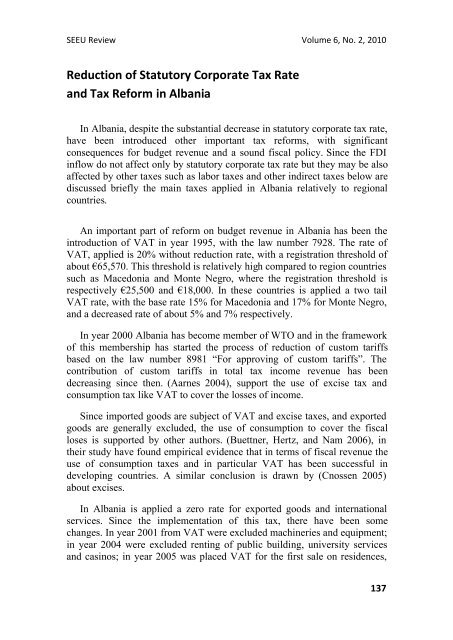SEEU Review vol. 6 Nr. 2 (pdf) - South East European University
SEEU Review vol. 6 Nr. 2 (pdf) - South East European University
SEEU Review vol. 6 Nr. 2 (pdf) - South East European University
You also want an ePaper? Increase the reach of your titles
YUMPU automatically turns print PDFs into web optimized ePapers that Google loves.
<strong>SEEU</strong> <strong>Review</strong> Volume 6, No. 2, 2010Reduction of Statutory Corporate Tax Rateand Tax Reform in AlbaniaIn Albania, despite the substantial decrease in statutory corporate tax rate,have been introduced other important tax reforms, with significantconsequences for budget revenue and a sound fiscal policy. Since the FDIinflow do not affect only by statutory corporate tax rate but they may be alsoaffected by other taxes such as labor taxes and other indirect taxes below arediscussed briefly the main taxes applied in Albania relatively to regionalcountries.An important part of reform on budget revenue in Albania has been theintroduction of VAT in year 1995, with the law number 7928. The rate ofVAT, applied is 20% without reduction rate, with a registration threshold ofabout €65,570. This threshold is relatively high compared to region countriessuch as Macedonia and Monte Negro, where the registration threshold isrespectively €25,500 and €18,000. In these countries is applied a two tailVAT rate, with the base rate 15% for Macedonia and 17% for Monte Negro,and a decreased rate of about 5% and 7% respectively.In year 2000 Albania has become member of WTO and in the frameworkof this membership has started the process of reduction of custom tariffsbased on the law number 8981 “For approving of custom tariffs”. Thecontribution of custom tariffs in total tax income revenue has beendecreasing since then. (Aarnes 2004), support the use of excise tax andconsumption tax like VAT to cover the losses of income.Since imported goods are subject of VAT and excise taxes, and exportedgoods are generally excluded, the use of consumption to cover the fiscalloses is supported by other authors. (Buettner, Hertz, and Nam 2006), intheir study have found empirical evidence that in terms of fiscal revenue theuse of consumption taxes and in particular VAT has been successful indeveloping countries. A similar conclusion is drawn by (Cnossen 2005)about excises.In Albania is applied a zero rate for exported goods and internationalservices. Since the implementation of this tax, there have been somechanges. In year 2001 from VAT were excluded machineries and equipment;in year 2004 were excluded renting of public building, university servicesand casinos; in year 2005 was placed VAT for the first sale on residences,137
















